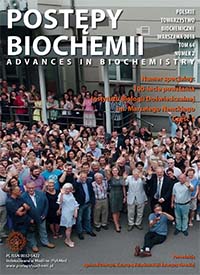Deregulation of epigenetic mechanisms in cancer
DOI:
https://doi.org/10.18388/pb.2018_125Abstract
Gene expression of both normal and cancer cell is tightly regulated by specific transcription regulators and epigenetic mechanisms such as DNA methylation, histone
modifications (acetylation, methylation, phosphorylation), nucleosome remodeling and non-coding RNAs. Deregulation of epigenetic mechanisms plays a pivotal role in cancer, although researchers debate if it is a cause or a consequence of oncogenic transformation. Independently from the way in which epigenetic alterations arise in cancer, downstream effects will result in profound changes in transcriptomic and subsequently proteomic profiles. In most cases, changes in expression of epigenetic genes produce functional advantages in cell proliferation, tumor growth and/or migration capacity. Most of epigenetic changes in cancer are triggered by genomic alterations in specific genes that are involved in controlling one of the epigenetic mechanisms. However, there are also mutations in cell metabolism-related genes that affect activities of DNA demethylating enzymes and histone modifiers. Histone modifications are deregulated in cancer mostly due to alterations in genes coding for enzymes that attach or remove histone modifications. Mutations in genes coding for nucleosome remodelers result in aberrant global chromatin organization and facilitate subsequent global alterations of gene copy number or translocations. Recent advancements in next generation sequencing allowed for more precise mapping of global changes in the epigenetic landscape in cancer.
Downloads
Published
Issue
Section
License
All journal contents are distributed under the Creative Commons Attribution-ShareAlike 4.0 International (CC BY-SA 4.0) license. Everybody may use the content following terms: Attribution — You must give appropriate credit, provide a link to the license, and indicate if changes were made, ShareAlike — If you remix, transform, or build upon the material, you must distribute your contributions under the same license as the original. There are no additional restrictions — You may not apply legal terms or technological measures that legally restrict others from doing anything the license permits.
Copyright for all published papers © stays with the authors.
Copyright for the journal: © Polish Biochemical Society.




